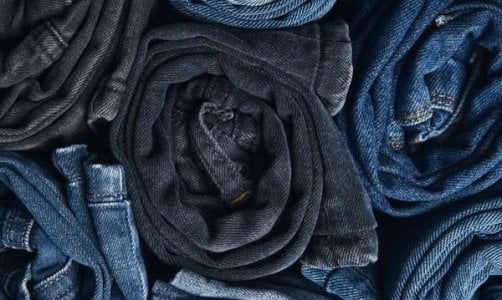Find out from the pros: How often should you wash your jeans to preserve their colour and maximise lifespan?
- Replies 5
Ah, the age-old debate: How frequently should we wash our jeans? And does it truly make a difference?
Well, fear not, dear members, we have the ultimate guide from denim experts, ensuring you can maximise the longevity of your cherished blue (or black, white, or any other colour) jeans.
Levi's design director, Paul O'Neill, shared his insight about how often jeans should hit the washing machine. Contrary to the belief held by many that jeans should never be washed, he revealed that he pops his in a cold wash every 30 to 50 wears and strictly avoids the tumble dryer.
Paul recommends washing jeans solo on a gentle cycle to minimise the risk of colour running.
Bassike co-founder Mary Lou Ryan takes a slightly different approach, washing her jeans only when necessary. 'I wash them inside out to protect the outside fibres, on a gentle cycle, if they have a stain,' she explained.

It's important to note that there's no 'official' rule for washing jeans, and personal preference plays a big part. Some individuals opt to forgo washing their jeans entirely, instead freshening them up with alternative methods such as spraying them with vinegar, placing them in the freezer, or hanging them outdoors in the sun to kill bacteria.
When washing your jeans, Mary suggests using a small amount of mild detergent and treating stains with a dab of laundry spray.
Denim blogger and Jane on Jeans newsletter author Jane Herman chimed in, stating that the frequency with which one should wash their jeans ultimately depends on the individual.
'I wash my jeans. Not every time I wear them, but I have small children, so food stains and playground mess are always reasons to wash,' she said.
Jane believes that avoiding washing jeans, while being a popular choice, might not be the smartest choice for everyone. She explains that new pre-washed jeans that most people purchase nowadays won't benefit from skipping washes, unlike 100 per cent cotton indigo denim.
'If you don't want to wash your jeans, don't. If you do, fine. They're jeans; they can take it. That's what makes them so great,' Jane affirmed.
She, too, agreed with Paul and Mary on the ideal washing method: cold water only, mild detergent, and always air-drying.


Different Types of Denim Materials and Their Durability
Our trusty jeans come in many shapes and forms, and the type of denim used can significantly impact their durability and how well they withstand regular washing.
Traditional raw denim, or the classic 100 per cent cotton indigo denim, is known for its stiffness and rich, unwashed colour. Over time, raw denim tends to take the shape of the wearer's body, becoming softer and more comfortable. To preserve this unique quality, many enthusiasts choose to limit the number of washes and opt for spot cleaning instead.
On the other hand, stretch denim is popular among those who value comfort and ease of movement. Its incorporation of elastane or spandex with cotton allows for a snug fit while maintaining flexibility.
However, due to the nature of these synthetic fibres, stretch denim may not hold up to repeated washing compared to its pure cotton counterpart. To maintain the fabric's integrity and colour, following expert recommendations on washing infrequently and at a lower temperature is best.
Another type of denim we have seen in recent years is the eco-friendly and sustainable variety made from organic cotton or recycled fabric blends. As the planet-loving option, these jeans are designed to reduce environmental impact. Since these fabrics can sometimes be more delicate than traditional denim, paying extra attention to the washing instructions on the garment label to ensure your jeans last as long as possible is essential.
Regarding the final finish of your jeans, there are multiple options ranging from stone-washed to acid-washed and more. While the fibres don't dictate the jeans' longevity, how they're treated post-production can influence their wash and wear patterns. For instance, pre-washed jeans, mimicking a worn-in vintage feel, may not require a different strict washing regimen compared to raw denim.
In conclusion, the type of denim that makes up your jeans should be a consideration when deciding how often and in what manner they need to be washed. Remember, proper care helps preserve colour and longevity and ensures your favourite pair feels comfortable and looks great for years to come.
So there you have it, members: the inside scoop on taking care of your jeans. While there's no one-size-fits-all answer, feel free to experiment with different washing frequencies and techniques for your favourite denim, considering your lifestyle and preferences.
Happy washing—or not! Do you have other advice or tips to share? Let us know in the comments below!
Well, fear not, dear members, we have the ultimate guide from denim experts, ensuring you can maximise the longevity of your cherished blue (or black, white, or any other colour) jeans.
Levi's design director, Paul O'Neill, shared his insight about how often jeans should hit the washing machine. Contrary to the belief held by many that jeans should never be washed, he revealed that he pops his in a cold wash every 30 to 50 wears and strictly avoids the tumble dryer.
Paul recommends washing jeans solo on a gentle cycle to minimise the risk of colour running.
Bassike co-founder Mary Lou Ryan takes a slightly different approach, washing her jeans only when necessary. 'I wash them inside out to protect the outside fibres, on a gentle cycle, if they have a stain,' she explained.

According to denim experts, washing your jeans every 30 to 50 times you wear them is recommended, using a gentle cycle. Credit: Shutterstock.
It's important to note that there's no 'official' rule for washing jeans, and personal preference plays a big part. Some individuals opt to forgo washing their jeans entirely, instead freshening them up with alternative methods such as spraying them with vinegar, placing them in the freezer, or hanging them outdoors in the sun to kill bacteria.
When washing your jeans, Mary suggests using a small amount of mild detergent and treating stains with a dab of laundry spray.
Denim blogger and Jane on Jeans newsletter author Jane Herman chimed in, stating that the frequency with which one should wash their jeans ultimately depends on the individual.
'I wash my jeans. Not every time I wear them, but I have small children, so food stains and playground mess are always reasons to wash,' she said.
Jane believes that avoiding washing jeans, while being a popular choice, might not be the smartest choice for everyone. She explains that new pre-washed jeans that most people purchase nowadays won't benefit from skipping washes, unlike 100 per cent cotton indigo denim.
'If you don't want to wash your jeans, don't. If you do, fine. They're jeans; they can take it. That's what makes them so great,' Jane affirmed.
She, too, agreed with Paul and Mary on the ideal washing method: cold water only, mild detergent, and always air-drying.
Key Takeaways
- Denim experts suggest washing jeans every 30 to 50 wears on a gentle cycle to help them last longer and maintain colour.
- One expert recommends washing jeans inside out to protect the outside fibres, using a small amount of mild detergent and laundry spray for stains.
- There is no 'official' way to wash jeans, and some people opt for alternative methods such as spraying them with vinegar, freezing them, or hanging them in the sun to kill bacteria.
- Ultimately, how often and how you wash your jeans depends on personal preference and individual lifestyles, as jeans are meant to be durable and withstand different cleaning methods.

Washing jeans doesn't have a one-size-fits-all approach, and people often explore alternative methods to keep them clean. Credit: Unsplash/ninjason.
Different Types of Denim Materials and Their Durability
Our trusty jeans come in many shapes and forms, and the type of denim used can significantly impact their durability and how well they withstand regular washing.
Traditional raw denim, or the classic 100 per cent cotton indigo denim, is known for its stiffness and rich, unwashed colour. Over time, raw denim tends to take the shape of the wearer's body, becoming softer and more comfortable. To preserve this unique quality, many enthusiasts choose to limit the number of washes and opt for spot cleaning instead.
On the other hand, stretch denim is popular among those who value comfort and ease of movement. Its incorporation of elastane or spandex with cotton allows for a snug fit while maintaining flexibility.
However, due to the nature of these synthetic fibres, stretch denim may not hold up to repeated washing compared to its pure cotton counterpart. To maintain the fabric's integrity and colour, following expert recommendations on washing infrequently and at a lower temperature is best.
Another type of denim we have seen in recent years is the eco-friendly and sustainable variety made from organic cotton or recycled fabric blends. As the planet-loving option, these jeans are designed to reduce environmental impact. Since these fabrics can sometimes be more delicate than traditional denim, paying extra attention to the washing instructions on the garment label to ensure your jeans last as long as possible is essential.
Regarding the final finish of your jeans, there are multiple options ranging from stone-washed to acid-washed and more. While the fibres don't dictate the jeans' longevity, how they're treated post-production can influence their wash and wear patterns. For instance, pre-washed jeans, mimicking a worn-in vintage feel, may not require a different strict washing regimen compared to raw denim.
In conclusion, the type of denim that makes up your jeans should be a consideration when deciding how often and in what manner they need to be washed. Remember, proper care helps preserve colour and longevity and ensures your favourite pair feels comfortable and looks great for years to come.
So there you have it, members: the inside scoop on taking care of your jeans. While there's no one-size-fits-all answer, feel free to experiment with different washing frequencies and techniques for your favourite denim, considering your lifestyle and preferences.
Happy washing—or not! Do you have other advice or tips to share? Let us know in the comments below!







